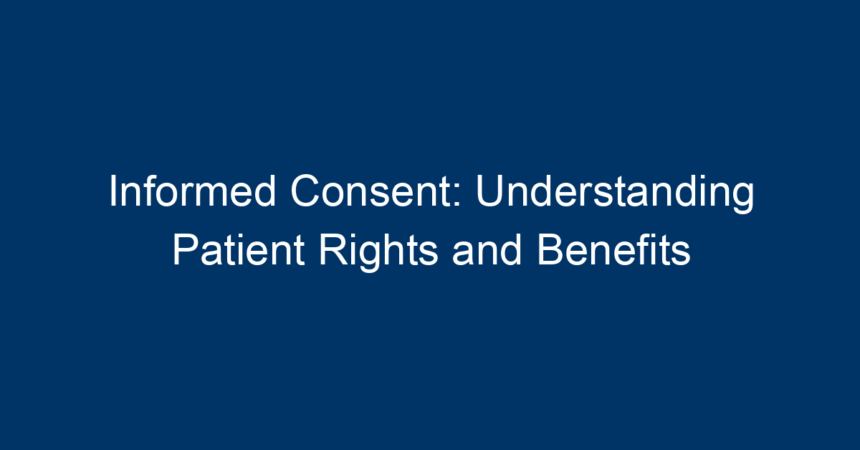In the modern healthcare landscape, one concept stands out as a cornerstone of ethical medical practice: informed consent. This essential process empowers patients to make knowledgeable decisions about their healthcare, ensuring they understand the nature of the treatments they are considering. Informed consent not only embodies the principle of autonomy but also enhances trust between patients and healthcare providers. In this article, we’ll explore what informed consent is, its significance, the process involved, and patient rights, while helping you understand the numerous benefits it brings to the patient experience.
What is Informed Consent?
Informed consent is a legal and ethical requirement that mandates healthcare providers to share pertinent information with patients before they agree to undergo any medical procedure or treatment. It goes beyond merely obtaining a signature on a form; informed consent is a dialogue that ensures the patient comprehends the implications of their choices.
Key Elements of Informed Consent
-
Disclosure of Information: Patients must receive clear, thorough information regarding their diagnosis, the nature of proposed interventions, potential risks and benefits, and alternative treatments available.
-
Comprehension: It is vital that the patient understands the provided information. Healthcare providers should use clear language that is free from medical jargon and encourage patients to ask questions.
-
Voluntariness: Consent must be given freely, without coercion. Patients should feel empowered to make decisions that align with their values and preferences.
- Competence: The patient must have the mental capacity to understand the information and make a decision. Assessing a patient’s competence is crucial, especially for individuals with cognitive impairments or minors.
The Importance of Informed Consent
Enhancing Patient Autonomy
At the heart of informed consent lies the principle of patient autonomy. Patients have the right to make decisions regarding their healthcare, and informed consent ensures they are actively involved in that process. By understanding the implications of their choices, patients can weigh the benefits and risks, ultimately leading to more satisfactory and personalized healthcare experiences.
Building Trust in Healthcare
A crucial aspect of an effective patient-provider relationship is trust. By engaging in thorough discussions about treatment options and risks, healthcare professionals convey respect for the patient’s autonomy and choices. When patients feel informed and respected, they are more likely to foster confidence in their healthcare team, which can enhance treatment outcomes.
Reducing Legal Risks
From a legal perspective, informed consent is also vital in protecting healthcare providers from potential litigation. If patients understand the risks associated with a procedure and still choose to proceed, they are less likely to claim malpractice if something goes awry. Proper documentation of the informed consent process provides evidence that providers fulfilled their ethical and legal obligations.
The Informed Consent Process
Initial Discussion: Creating an Open Dialogue
The informed consent process begins with an open dialogue between the healthcare provider and the patient. This conversation should outline the following:
- Diagnosis: What condition is being treated?
- Proposed Treatment: What are the options?
- Risks and Benefits: What might happen? What are the potential positive outcomes?
- Alternatives: Are there other treatment options available?
- Questions and Concerns: Patients should feel comfortable asking questions.
Providing Written Information
In many cases, healthcare providers will offer written materials to supplement verbal discussions. This can include brochures or documents that detail the treatment, risks, and benefits. Providing written information allows patients to review the material at their own pace and facilitates better comprehension.
Documenting Consent
Obtaining consent typically involves the patient signing a consent form. This form should accurately reflect what was discussed, ensuring it covers all essential elements outlined in the initial discussion. Documentation serves as protection for both patient and provider and should be stored securely in the patient’s medical record.
Patient Rights in Informed Consent
Understanding your rights as a patient in the context of informed consent is crucial. Below are some essential rights that patients should be aware of:
Right to Information
Patients have the right to receive all relevant information regarding their medical condition and treatment options. This extends to being aware of any financial implications of the procedures as well.
Right to Ask Questions
Never hesitate to ask questions or express concerns. Patients have the right to seek clarification on any part of the treatment process. A healthcare provider should encourage and welcome inquiries, as they aim to foster an understanding and collaborative environment.
Right to Refuse Treatment
Patients have the right to refuse any treatment, even after they have consented. This autonomy is critical and aligns with ethical medical practice.
Right to Change Your Mind
If a patient changes their mind or feels uncomfortable with a proposed treatment, they should feel empowered to reassess their decision at any time.
Benefits of Informed Consent
Empowerment
Informed consent empowers patients by involving them in their healthcare decisions. When patients believe they have a say in their treatment, it can lead to increased satisfaction and adherence to the treatment plan.
Improved Outcomes
Studies have shown that when patients are well-informed and engaged in their treatment decisions, healthcare outcomes tend to improve. This can include faster recovery times, reduced complication rates, and greater overall satisfaction with care.
Enhanced Quality of Care
Informed consent is a critical aspect of high-quality healthcare. When providers and patients communicate effectively, it fosters a safer, more person-centered approach to medical care.
Navigating Challenges in Informed Consent
While the principle of informed consent is straightforward, several challenges can arise:
Complex Medical Information
Some medical conditions and treatments involve complex information that can be difficult for patients to grasp. In these cases, providers need to be particularly diligent about breaking down information into manageable segments.
Cultural Considerations
Cultural beliefs and values can influence how patients perceive medical information and make decisions. Healthcare providers must be sensitive to these differences and tailor their communication accordingly.
Time Constraints
In busy healthcare settings, time constraints can inhibit thorough discussions. Providers should strive to allocate sufficient time for obtaining informed consent, recognizing the significance of this process in fostering a trusting relationship.
Conclusion: Taking Action on Informed Consent
Informed consent is not just a legal formality; it is a vital component of ethical healthcare practice. It empowers patients, enhances the quality of care, and builds trust between healthcare providers and those they serve.
Actionable Insights
- Be Proactive: Don’t hesitate to ask questions during your healthcare journey. Understanding your treatment options empowers you.
- Seek Written Information: Request brochures or written resources that explain your diagnosis and treatment. This can aid in your understanding.
- Evaluate Your Choices: Take your time to consider all available options and ask your provider for time to think through crucial decisions.
- Know Your Rights: Familiarize yourself with your rights regarding informed consent, ensuring you feel empowered and protected.
By prioritizing informed consent in healthcare, patients can reclaim their autonomy while fostering better health outcomes. Remember, it’s not just about signing a form—it’s about making informed choices that affect your health and well-being.




